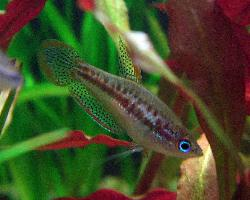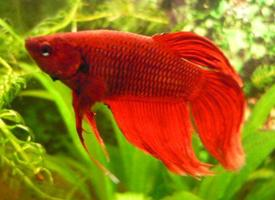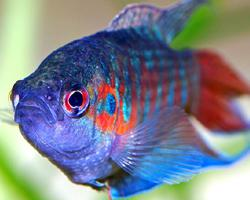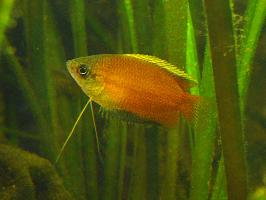
Állatleírás
The Pygmy Gourami, scientifically known as Trichopsis pumila, is a diminutive and enchanting species of freshwater fish that captivates aquarists worldwide. Native to the densely vegetated and slow-moving waters of Southeast Asia, including countries like Vietnam, Cambodia, and Thailand, this species thrives in environments that mimic their natural habitat, characterized by a plethora of aquatic plants and a soft, acidic water composition.Adult Pygmy Gouramis typically reach a size of around 3.5 to 4 cm (1.4 to 1.6 inches) in length, making them one of the smallest members of the gourami family. Their body is elongated and slightly compressed laterally, adorned with an array of captivating colors and patterns. The base coloration of these fish ranges from a soft, iridescent blue to green, overlaid with delicate, transverse stripes that can appear more pronounced depending on the fish's mood and environmental factors. The ventral fins are elongated and thread-like, aiding in navigation and balance, while their dorsal and anal fins are broad, facilitating slow and precise movements through their aquatic surroundings.
One of the most fascinating aspects of the Pygmy Gourami is its ability to breathe air directly from the surface due to a specialized labyrinth organ. This adaptation allows them to survive in waters with low oxygen levels, where other fish might struggle. They frequently rise to the water's surface to gulp air, which is then absorbed into their bloodstream through the labyrinth organ, a trait that exemplifies their resilience and adaptability.
The Pygmy Gourami is also known for its unique mode of communication. Males of the species are capable of producing a distinctive croaking or clicking sound, especially during courtship displays or territorial disputes. This sonic communication is produced by the rapid movement of their pectoral fins against their body, a behavior that adds another layer of intrigue to their already fascinating nature.
Breeding Pygmy Gouramis can be a rewarding experience for aquarists. Like many gouramis, they are bubble nest builders. The male constructs a floating nest from bubbles, plant debris, and saliva at the water surface. After an elaborate courtship dance, the female lays her eggs, which the male then fertilizes and carefully incorporates into the nest. The male guards the nest vigilantly until the fry hatch and become free-swimming, showcasing the species' strong parental instincts.
In the aquarium, Pygmy Gouramis are generally peaceful and can coexist with other small, non-aggressive fish. They thrive in well-planted tanks that offer plenty of hiding spots and a gentle water flow, replicating their natural habitat. Their diet in captivity includes a variety of foods, from high-quality flake and micro pellet foods to small live or frozen foods like brine shrimp and daphnia.
Overall, the Pygmy Gourami is a jewel among freshwater fish, offering a combination of beauty, intriguing behavior, and resilience. Its presence in the aquarium not only adds a splash of color and life but also provides a window into the complex and fascinating world of aquatic ecosystems.
Hasonló állatok
Új állatfotók
Top 10 állat
- Dolphin gull (Leucophaeus scoresbii)
- Diana monkey (Cercopithecus diana)
- Moustached guenon (Cercopithecus cephus)
- Galápagos tortoise (Geochelone nigra complex)
- Japanese macaque (Macaca fuscata)
- Russian tortoise (Testudo horsfieldii)
- Stone loach (Barbatula barbatula)
- Greek tortoise (Testudo graeca)
- Common flying dragon (Draco volans)
- Vendace (Coregonus albula)


